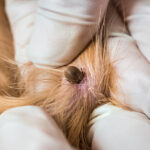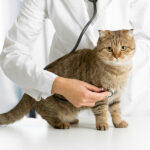Because we love our pets, we love to treat them with an occasional special snack! While cats may not gobble it up as quickly as dogs, cats enjoy a little indulgence, too; however, there are foods to avoid or limit when it comes to treating your feline friend.
Keeping your cat on a cat-friendly diet can prevent a lot of health issues. Most human foods are perfectly safe for cats, but others can pose a serious health risk which is why it’s important to limit human food to very rare occasions, if at all.
There are many human snacks that may seem harmless to cats but can cause severe illness or even death. In fact, there is so much misinformation about what cats can consume that many owners unintentionally give treats that can cause major health issues.
Next time your cat deserves an extra snack, refer to the lists below to make sure the treat does them good instead of harm.
7 Foods Your Cat Should Never Eat
Chocolate
Just like dogs, chocolate is also harmful to cats. Chocolate contains theobromine and caffeine, both of which are toxic to cats.
Even the smallest amount can cause severe upset stomach, increased body temperature, rapid breathing or heart rate, and even seizures.
If your cat has chowed on any amount of chocolate, give your veterinarian a call immediately.
Onions, Chives, and Garlic
Onions, garlic, chives, and other members of the allium family can cause anemia in cats, damaging their red blood cells and causing nausea, abdominal pain, vomiting, and diarrhea.
Milk and Dairy Products
There are fewer things you might consider “quintessentially cat” than a litter of kitties gathered around a saucer of warm milk. Truth be told, most cats are lactose intolerant!
That means, any dairy product from cows, sheep, and goats can cause digestive issues and stomach upset in adult cats and kittens.
For kittens who are too young to eat solid foods, consult your veterinarian for specific formulas so it can get all the nutrients your cat needs.
Grapes and Raisins
Grapes and raisins can cause acute liver damage to dogs. The exact reason behind their toxicity in cats is still a mystery, but the risk is still too great to take a chance just for a special treat.
All cats are different, so it’s not guaranteed that your cat will experience kidney failure if ingested but keep the fruit in the fridge just in case.
Caffeine and Alcohol
Even the smallest amounts of alcohol or caffeine can be fatal to felines. Because cats’ stomachs are small, it doesn’t take much to cause a bout of nasty symptoms, like digestive upset, breathing troubles, disorientation, coma, and even death.
Keep open containers of these drinks away from cats and clean up spills immediately.
Tuna
What cat can’t eat Tuna?! Contrary to popular belief, tuna can be harmful to cats and should only be given as a special treat. Too much tuna can lead to mercury poisoning.
Cats are naturally attracted to Tuna because of its powerful smell and robust flavor. Since canned tuna is prepared for humans, it lacks the nutrients necessary in a cat’s diet.
Raw Meat or Eggs
Raw meat and eggs are just as dangerous for cats as humans. Raw meat, raw fish, and raw eggs are more likely to contain bacteria, like E. coli, salmonella, or parasites, some of which are resistant to antibiotics.
Additionally, an enzyme in raw fish works to destroy an essential B vitamin called thiamine. Without this vitamin, your cat can experience serious neurological problems and even lead to convulsions or coma.
There are many tasty treats cats can enjoy. It’s always best to stick to a vet-approved treat regime, but if you are going to feed your cat human food, make sure it’s a safe one.
If you have any questions about what foods your cat should or should not eat, give us a call.






